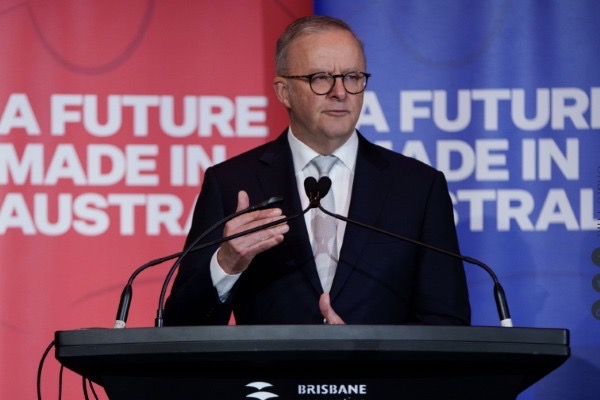Published on the 17/04/2024 | Written by Heather Wright

Support and subsidies for innovative industry tech promised…
Australian Prime Minister Anthony Albanese is unapologetically upping interventionist plans for the federal government, saying it will directly intervene to support and subsidise innovative technologies for industry.
In a speech at the Queensland Media Club, Albanese told attendees the government needed to be ‘more strategic, more sophisticated and a more constructive contributor’ in order to match the approach taken by other nations, including the US with its US$369 billion Inflation Reduction Act and Chips and Science Act with its US$280 billion to boost research and manufacturing of semi-conductors.
“This is not about ideology. It’s about opportunity – and urgency,”
Similar measures have been introduced in Japan, with the Economic Security Promotion Act, and the EU, with its Economic Security Strategy, while countries including Korea and Canada are also offering up new measures.
“All these countries are investing in their industrial base, their manufacturing capability and their economic sovereignty and – critically – none of this is merely being left to market forces or trusted to the invisible hand,” he says.
The ‘heavy lifting’ of economic transition and industrial transformation is not being done individuals, companies or communities on their own, but instead is being facilitated, enabled and empowered by national governments across the political spectrum.
“Because this is not about ideology. It’s about opportunity – and urgency,” he says.
New and existing initiatives, including the $15 billion National Reconstruction Fund will be pulled together in the Future Made in Australia Act, designed to boost investment, create jobs and seize the opportunities of a future made in Australia. That includes investing in new industries.
Albanese says.
While no real detail was revealed about the Act, it is expected to include incentives and underwriting of some projects, particularly around clean energy.
A recent poll by the Economic Society of Australia found two-thirds of the 44 leading economists taking part backed grants to innovative firms across the entire economy in response to the US Inflation Reduction Act, which supports clean energy.
“We need sharper elbows when it comes to marking out our national interest. And we need to be willing to break with old orthodoxies and pull new levers to advance the national interest,” Albanese said in the address which puts industry policy front and centre of his agenda for the budget and next election.
He went on to say that Australia can’t afford to ‘sit on the sidelines’.
“We have to think differently about what government can – and must – do to work alongside the private sector to grow the economy.”
Albanese argues that the plans are not ‘old protectionism’ but rather about new competition, with economic policies around the world changing and other countries also moving towards direct intervention and investing in their industrial base, manufacturing capability and economic sovereignty.
“These nations are not withdrawing from global trade or walking away from world markets or the rules based order, and let me be clear, nor should Australia.”
While Australia would continue to champion global markets and free trade and build bilateral and multilateral cooperation and agreements, he says other countries are showing widespread willingness to make economic interventions on the basis of national interest and national sovereignty, and Australia must do the same.
“The partners we seek are moving to the beat of a new economic reality. In their different ways, they are realigning their economies to better drive and distribute growth across their own populations,” he says.
“They are preparing their businesses and workforces to adapt to digital technology, to grasp the opportunities of artificial intelligence and also safeguard against it’s risks.”
He also called out investments in clean energy, and upgrades to ports, roads, rail, broadband and energy grids.
“Of course, not every element of every other nation’s approach will be right for us,” he notes.
“The heavy lifting of economic transition and industrial transformation is not being done by individuals, companies or communities on their own. It is being facilitated, enabled and empowered by national Governments from every point on the political spectrum. Because this is not about ideology, it’s about opportunity – and it’s about urgency.
“Securing jobs, attracting investment and building prosperity has never been a polite and gentle process where every nation gets a turn – it’s always a contest, it’s always a race.”



























